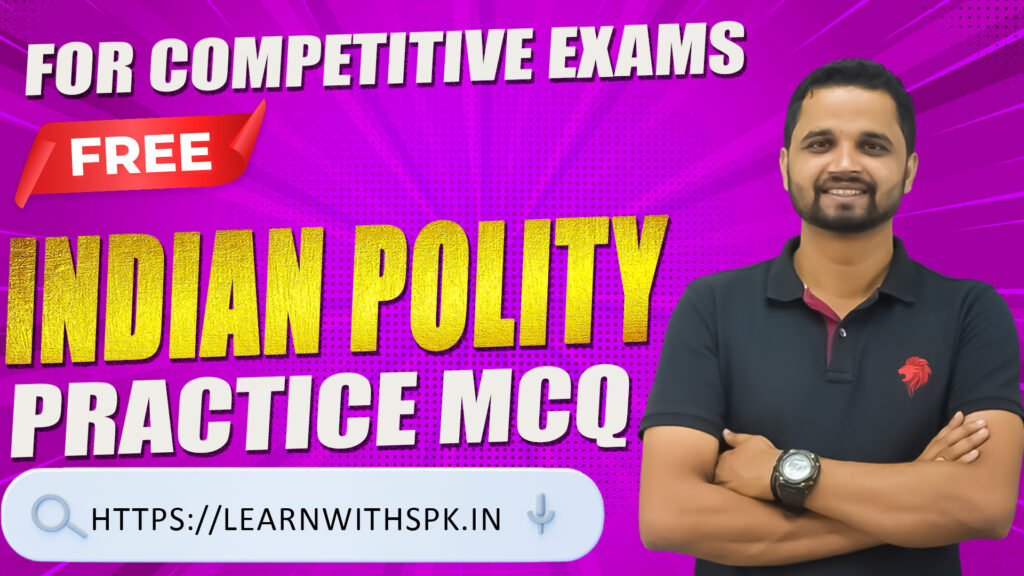Are you preparing for competitive exams like ADRE, UPSC, SSC, State PSC, Railways, or Banking? Indian Polity is a scoring subject, but it requires strong conceptual clarity and regular practice.
In this post, we bring you a set of carefully selected Indian Polity practice MCQs with answers hidden until you choose to view them. This will help you revise quickly while testing your retention.

Why Practice Indian Polity MCQs?
Indian Polity questions test your knowledge of the Constitution, governance structure, political system, and related laws. Practicing MCQs helps in:
- Quick revision before exams.
- Understanding the pattern of questions.
- Improving time management during tests.
- Strengthening weak concepts through repetition.
Features of This Practice MCQ Set
- Based on latest exam trends and previous year papers.
- Suitable for UPSC Prelims, SSC CGL, Banking, Railways, CDS, NDA and other exams.
- Covers Fundamental Rights, Parliament, Judiciary, Amendments, and Governance.
- Answers given right under each question for instant learning.
Indian Polity Practice MCQs
Indian Polity is one of the most scoring topics in exams like ADRE, UPSC, SSC, State PSCs, Banking, Railways, Defence, and other government recruitment tests. Regular practice of MCQs will help you remember important constitutional provisions and understand governance concepts clearly.
Q.1 Who elects the President of India? ভাৰতৰ ৰাষ্ট্ৰপতি কোনে নিৰ্বাচন কৰে?
a) Members of Parliament only কেৱল সংসদৰ সদস্য
b) Electoral College consisting of MPs and MLAs সাংসদ আৰু বিধায়কৰে গঠিত নিৰ্বাচনী মহাবিদ্যালয়
c) State Governors ৰাজ্যিক ৰাজ্যপালসকল
d) Supreme Court Judges উচ্চতম ন্যায়ালয়ৰ ন্যায়াধীশ
Q.2 What is the minimum age to become the President of India? ভাৰতৰ ৰাষ্ট্ৰপতি হোৱাৰ নূন্যতম বয়স কিমান?
a) 25
b) 30
c) 35
d) 40
Q.3 The President of India is elected for a term of: ভাৰতৰ ৰাষ্ট্ৰপতিক কাৰ্যকালৰ বাবে নিৰ্বাচিত কৰা হয়:
a) 4 years
b) 5 years
c) 6 years
d) 7 years
Q.4 Who administers the oath of office to the President? ৰাষ্ট্ৰপতিৰ শপত কোনে প্ৰদান কৰে?
a) Prime Minister প্ৰধানমন্ত্ৰ
b) Chief Justice of India ভাৰতৰ মুখ্য ন্যায়াধী
c) Vice President উপ-ৰাষ্ট্ৰপতি
d) Speaker of Lok Sabha লোকসভাৰ অধ্যক্ষ
Q.5 The President can declare a National Emergency under: ৰাষ্ট্ৰপতিয়ে ৰাষ্ট্ৰীয় জৰুৰীকালীন অৱস্থা ঘোষণা কৰিব পাৰে:
a) Article 352
b) Article 356
c) Article 360
d) Article 370
Q.6 The Prime Minister is appointed by: প্ৰধানমন্ত্ৰীক নিযুক্তি দিয়া হয়:
a) The President ৰাষ্ট্ৰপত
b) The Vice President উপ-ৰাষ্ট্ৰপত
c) The Lok Sabha লোকসভ
d) The Supreme Court উচ্চতম ন্যায়ালয়
Q.7 Which article defines the appointment of the Prime Minister: কোনটো লেখাত প্ৰধানমন্ত্ৰীৰ নিযুক্তিৰ সংজ্ঞা দিয়া হৈছে?
a) Article 74
b) Article 75
c) Article 76
d) Article 77
Q.8 Who chairs the meetings of the Union Cabinet? কেন্দ্ৰীয় মন্ত্ৰীসভাৰ বৈঠকত কোনে অধ্যক্ষতা কৰে?
a) President ৰাষ্ট্ৰপতি
b) Prime Minister প্ৰধানমন্ত্
c) Vice President উপ- ৰাষ্ট্ৰপতি
d) Home Minister গৃহমন্ত্ৰী
Q.9 The Prime Minister is the leader of: প্ৰধানমন্ত্ৰীৰ নেতা হৈছে:
a) Rajya Sabha ৰাজ্যসভা
b) Lok Sabha লোকসভা
c) Both Houses দুয়োটা সদন
d) Supreme Court উচ্চতম ন্যায়ালয়
Q.10 Who was India’s first Prime Minister? ভাৰতৰ প্ৰথম প্ৰধানমন্ত্ৰী কোন আছিল?
a) Mahatma Gandhi মহাত্মা গান্ধী
b) Jawaharlal Nehru জৱাহৰলাল নেহৰু
c) Sardar Patel চৰ্দাৰ পেটেল
d) Indira Gandhi ইন্দিৰা গান্ধী
Q.11 The Prime Minister is the head of: প্ৰধানমন্ত্ৰীৰ মুৰব্বী হৈছে:
a) Judiciary ন্যায়পালিকা
b) Executive কাৰ্যবাহী
c) Legislature বিধানসভা
d) Armed Forces সশস্ত্ৰ বাহিনী
Q.12 The Council of Ministers is collectively responsible to: মন্ত্ৰী পৰিষদৰ সামূহিকভাৱে দায়বদ্ধ হৈছে:
a) President ৰাষ্ট্ৰপতি
b) Lok Sabha লোকসভা
c) Rajya Sabha ৰাজ্যসভা
d) Supreme Court উচ্চতম ন্যায়ালয়
Q.13 The minimum age to become Vice President is: উপ-ৰাষ্ট্ৰপতি হোৱাৰ নূন্যতম বয়স হ’ল-
a) 30
b) 35
c) 40
d) 45
Q.14 Who administers the oath to the Vice President? উপ-ৰাষ্ট্ৰপতিক কোনে শপত গ্ৰহণ কৰে?
a) President ৰাষ্ট্ৰপতি
b) Prime Minister প্ৰধানমন্ত্ৰী
c) Chief Justice of India ভাৰতৰ মুখ্য ন্যায়াধীশ
d) Speaker of Lok Sabha লোকসভাৰ অধ্যক্ষ
Q.15 The term of the Vice President is: উপ-ৰাষ্ট্ৰপতিৰ কাৰ্যকাল হ’ল-
a) 4 years
b) 5 years
c) 6 years
d) 7 years
Preparation Tips for Polity MCQs
- Revise the Constitutional Articles daily.
- Focus on Amendments, Fundamental Rights, and Directive Principles.
- Attempt at least 25 MCQs daily for revision.
Practicing these 15 Indian Polity MCQs will strengthen your understanding of constitutional concepts, governance structures, and rights-based frameworks. Keep revising regularly and test your knowledge before every major exam.
Frequently Asked Questions (FAQs) on Indian Polity Practice MCQs
Yes, the MCQs provided are aligned with the latest syllabus of major competitive exams and include questions from previous year papers and recent trends.
Try answering each question without looking at the answer. Check the hidden answer after attempting to assess your knowledge. Regularly revise incorrect or challenging questions for better retention.
A daily practice of at least 20–30 MCQs is effective to cover sufficient topics and maintain consistency, especially during the last 3–4 months of preparation.
While MCQs directly help in prelims, they also strengthen conceptual understanding necessary for mains and interviews.
Generally, the answers are provided after each question. Detailed explanations are available in our paid courses to clarify concepts further.